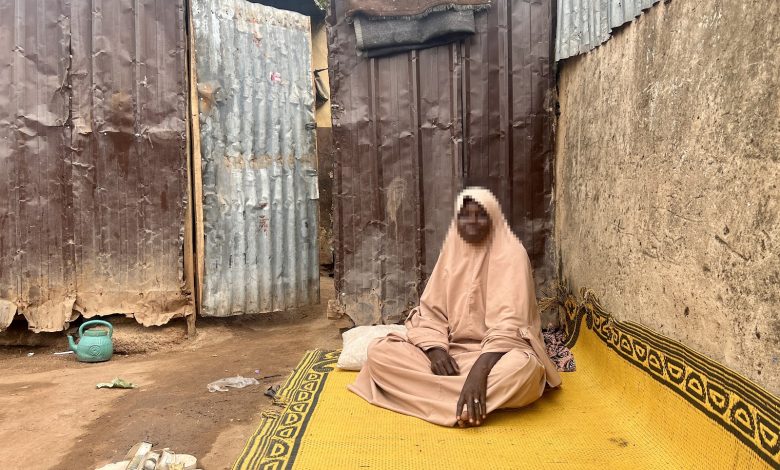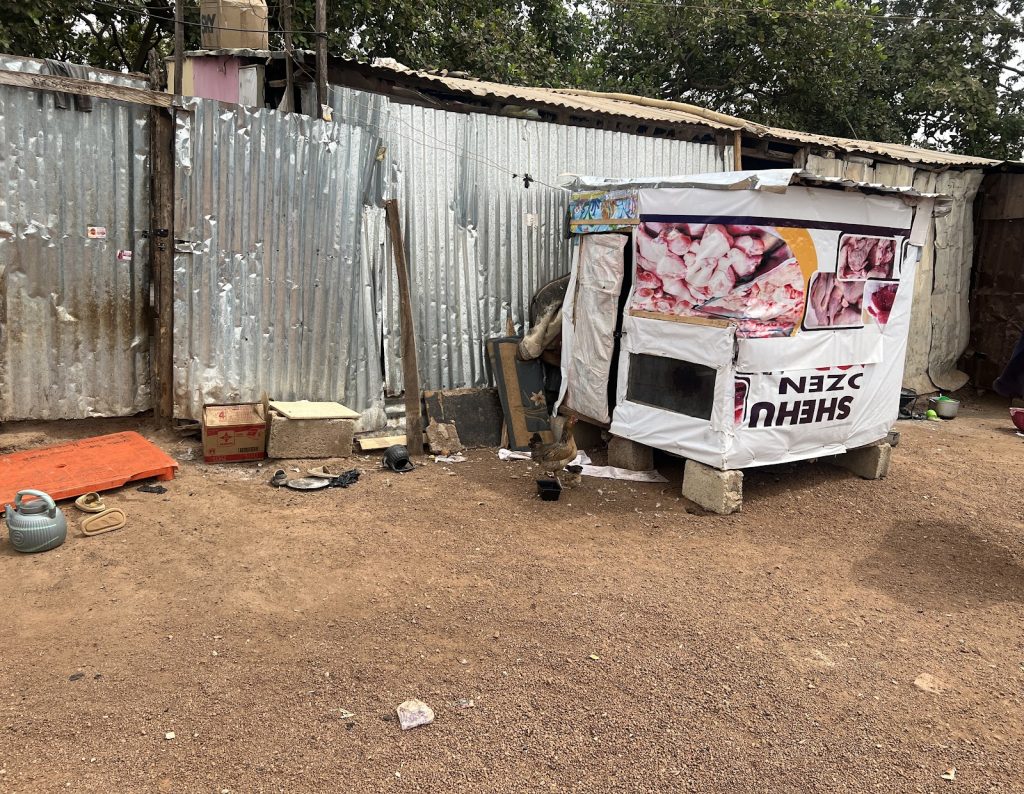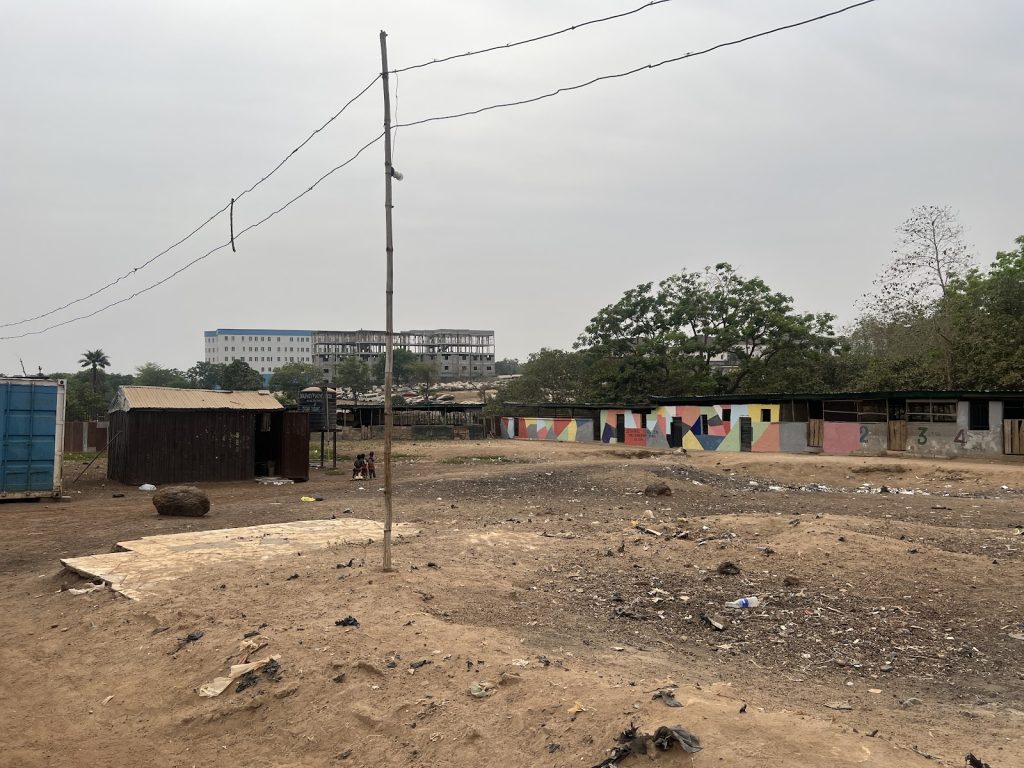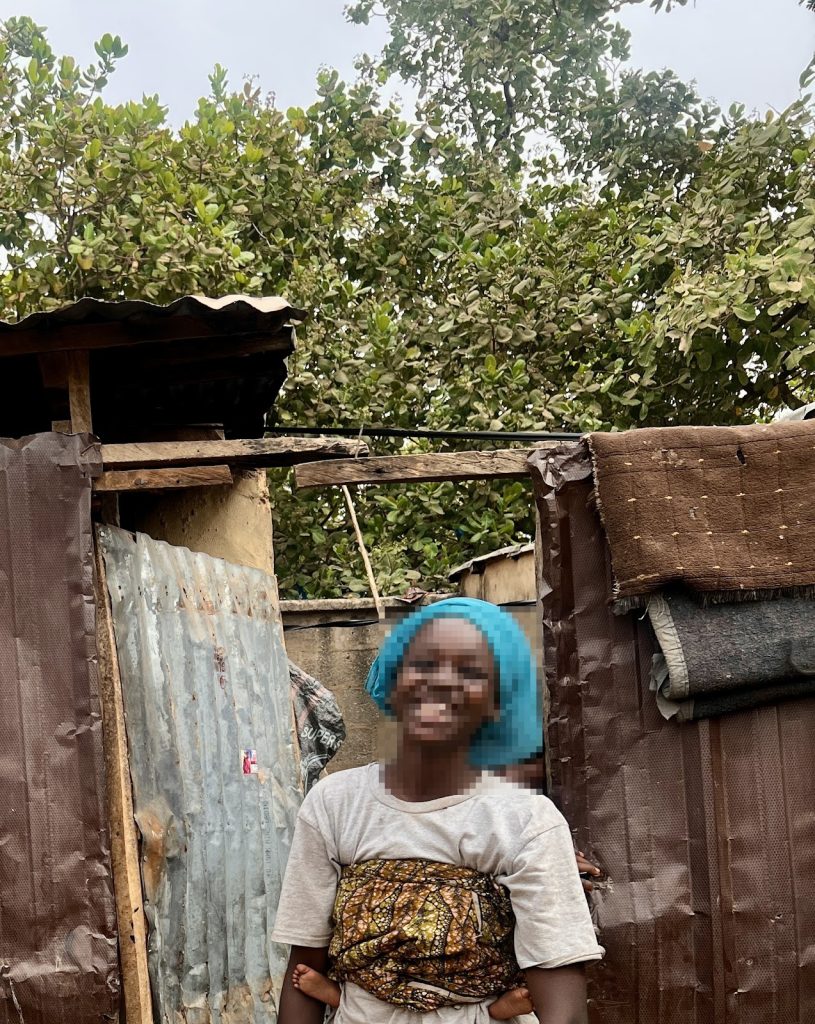A Displaced Widow’s Love For Her Chosen Son
This displaced widow enjoyed a frugal life with her family in Gwoza, northeastern Nigeria, before being violently displaced. After finally settling in an IDP camp in Nigeria’s Federal Capital, trying hard to provide for her children, she adopted another child.

Although Hadiza Aliyu did not know how she would save or change the life of a frail newborn abandoned in an uncompleted building, she knew she simply had to bring him home.
It was as if his spirit had beckoned her, she said. And even before she saw him, even before summoning the strength to meet the woman handing him over, she felt an inexplicable sense of empathy for him.
She trusted that God would assist her with the sustenance of his treatment, feeding, and upkeep, she told HumAngle. She will continue to sew clothes for a living and teach her daughters to do the same. She will also continue to serve as a midwife in the IDP Camp in which she lives.
Before Hadiza was displaced and widowed in 2014, she lived a peaceful and prosperous life with her husband in the Gwoza area of Borno State, northeastern Nigeria. She had a thriving business, selling fabrics that were always in high demand.
She also owned a farm, which she managed through a team of hired labourers who resided in makeshift rooms on the farm. She provided them with food, and they tended to her farm year-round. During harvest, a large truck would bring in her produce, and after a full day of sorting, she paid the workers either in cash or food, or both, as earlier agreed.
Her efforts were complemented by her husband, a businessman who owned three shops in town, where he sold a wide variety of clothes and shoes. Like his wife, he was also a livestock farmer.
“Sometimes, before heading out for the day, we would exchange products to sell for each other— I would sell his shoes, and he would sell my fabrics,” Hadiza said as she recalled the good old days.
One night in September 2014, Hadiza who was heavily pregnant, received a frantic warning from a neighbour who jumped over the fence into her yard. The neighbour alerted her that Boko Haram terrorists were abducting young girls and boys, and the chilling screams of the victims could be heard from a distance. With five daughters and two sons of her own, Hadiza’s concern for their safety became paramount.
“I started to panic. I knew the only safe exit was through the chickens’ cage in the backyard and my neighbour struggled to bring it down. Just then, we heard the sound of the terrorists’ car in front of my house. I felt a sudden rush of energy, ran back to gain momentum and slammed into the fence. It cracked slightly, just enough for me and my children to go through,” Hadiza explained.
Displaced
They ran down the alley behind her house until they arrived at a garden where they hid behind bushes and shrubs. Throughout these periods, her husband’s whereabouts were unknown. At around midnight, they got up from their hiding spots, took off their shoes, and silently walked under a dark, cloudy sky that soon split open and began to pour.
They walked and rested, and walked and rested, until the day broke. On getting to a town in the morning, she borrowed a phone and called her younger brother, who came with a car and drove them to Mubi in Adamawa State.
Upon arrival, Hadiza and her children were taken to a school that had been converted into a temporary settlement camp. They received essential provisions, including food, supplies, and cooking materials. Twenty-four days later, Hadiza welcomed a new addition to her family – a baby boy, born in the midst of uncertainty and displacement.
Like every mother, she reached out to Gwoza on the phone to share the news of childbirth but learnt that her husband had been killed during the attack. “I was informed that my husband was killed in one of his shops during an attack. They (family) found his body, prayed over it and buried it,” she narrated.
In a touching gesture, the relatives removed Hadiza’s husband’s silver ring and brought it back to her.
Multiple migrations
Hadiza and her children had only lived in Mubi for a month before the Boko Haram terrorist group attacked. It was October 2014 when the news spread that they had entered the town, meaning Hadiza had to flee again.
Hadiza was with her newborn and children, running with no clear direction until they found themselves at the Cameroon border. After hearing her stories, the soldiers at the border gave her some money. Too tired to keep going and unsure how to use it, she asked for help. The soldiers then drove her to a checkpoint in Jimeta, Adamawa State, where she asked to be taken to Maiduguri to stay with her aunt.
She lived with her aunt for three months, until in January 2015, her brother-in-law sent some money and a car for them to be taken to the FCT, Abuja where he offered to take care of them. But when they arrived, they were dropped off at an empty house and neglected.
Hadiza sold her gold earrings and the four fabrics she had managed to carry with her, at the market, using the money to buy food and thread. She and her eldest daughter began to sew caps so they could sell them.
For months, her children did not go to school. When her brother-in-law finally enrolled them, he only paid tuition at a government school, but did not buy their books.
“My brother-in-law acted as if we were becoming burdens to him. So, I told him to just let us leave and find our way. God is with us, and He will help us. That’s when he started insulting me, saying we should go beg on the streets or go to Area 1, where displaced people were. I was enraged,” Hadiza added.
In early 2016, she went to an Internally Displaced Persons (IDPs) camp in Durumi, in the FCT and spoke to the chairman. She was thereafter permitted to move in with her children.
“It was on a Friday. When I arrived at the camp, a Non-governmental Organisation had provided makeshift rooms, and the chairman gave me one to stay in with my two youngest children. He arranged for the rest of my children to stay with his cousins. I felt relieved and said, ‘Alhamdulillah, I’m home.’”


Becoming a foster mother
During HumAngle’s visit to the camp, Hadiza sat on a yellow mat in front of a small aluminium fence, enclosing two rooms and a living room, all built from the same material. It’s her home in the camp, built as part of a National Youth Corps Service community development programme. As she spoke, a baby boy happily climbed onto her.
“It has been a little over a year since I took in this baby. I named him Sadiq. Abubakar Sadiq. He’s growing up so fast. But when I first brought him, he was nothing but skin and bones. People kept asking, “What will you do with this child? He’s going to die. He won’t survive.” But I told them I had already made up my mind. If God allowed him to live, I would be the happiest person. If he died, I would accept it as divine decree. But I was determined to care for him,” Hadiza said.
When asked why she took him in despite having seven children, she said it was out of pity, as she couldn’t bear the thought of such a helpless baby being left without care.
“I cried so much when I saw him, thinking that if I left him like that, he would die. But God gave me the ability to take him to the hospital. We spent 25 days at Wuse District Hospital. He was malnourished and suffered from measles. Thankfully, an organisation took care of the hospital bills. They bought milk for him and when he latched onto the bottle, he wouldn’t let go until he finished everything.”
There were many people who wanted to take Sadiq from Hadiza, but she refused. First, it was the child/social welfare officials at the hospital who wanted to take him to an orphanage. Then, a doctor at the same hospital wanted to adopt him. And then her neighbour who had daughters, with no sons also wanted to take Sadiq, arguing that he even looked like her daughters.
“I wasn’t going to give him up. I took him in with pure intentions and for the sake of God. And he immediately touched my heart. He is light-skinned, has a dimple, and is very handsome. When I bathe him, he stares with his bright eyes straight into mine, and I just love him. And he loves me too. Even at night, if I wake up, he somehow senses it and wakes up as well,” Hadiza told HumAngle, explaining that her children also told her not to give the young born away. In fact, they welcomed him with open arms.
“When I bathe him, they all take turns carrying him on their backs. Whenever they have money, they buy drinks and clothes for him. See, they’re even playing with him now,” said Hadiza.

Abandoned children
Sadiq isn’t the first child Hadiza had attempted to care for. Seven years ago, in 2018, she was similarly called about a baby girl who had been abandoned by a river in Kabusa, Abuja. The woman who found her initially wanted to keep her, but her husband refused, fearing that he didn’t have enough to care for another child.
“My relative, who is a midwife, called me because I had expressed interest in raising a child before. We went to meet the family and they gave me the baby. We informed our camp chairman, and went to the Police Station to complete necessary documentation.”
A neighbour who accompanied Hadiza to meet the family expressed interest in raising the baby. She agreed and gave the baby to his family. He and his wife named her after Hadiza.
“She was a fresh newborn. Guests showered her with care, bringing formula, clothes, feeding bottles, and hair accessories. They later moved out of the camp but I’m still in touch with them. She’s a big girl now,” she narrated.
While it has become rampant over the years, abandoning children is a crime in Nigeria. Section 16 of the Violence Against Persons (Prohibition) Act 2015, prohibits the abandonment of a child without support. Those found guilty could face up to three years in prison or a fine of up to N500,000. Similarly, the National Human Rights Commission (NHRC) has repeatedly raised alarm over the problem. In February 2024 alone, they received 339 reports of abandoned child cases.
These incidents are prevalent in poor and displaced communities. The Boko Haram insurgency has displaced millions of people in Nigeria, with 60 per cent of the 1.4 million displaced people being children. These children are left vulnerable to abuse and exploitation, often forced into the streets to beg for survival or coerced into joining Boko Haram as child soldiers or suicide bombers.
Some babies are abandoned in hospitals, while others are left in unsafe places like public toilets, dumpsites, and bushes. While some are fortunate enough to be saved, many sadly die before being rescued.
Hadiza learnt of yet another incident in December last year, when a commercial motorcyclist found a baby abandoned in a bush. Unfortunately, the baby had already passed away by the time he was discovered, and the chairman of Hadiza’s camp could only arrange for his burial.
‘How we are surviving’ – Hadiza
To singlehandedly raise seven children as a displaced widow was something Hadiza never imagined, but she has adapted and persevered over the years. She has worked for a polio vaccination organisation, sells hand-made caps, and runs a food business to make ends meet. She also receives aid from humanitarian organisations. In the past year, however, the aid has waned. In February 2025, one of her daughters became very ill and Hadiza had to use all the money she had to cover her medical bills. She has since been struggling to revive her business.
“I make less food than I usually do to sell now. But I am doing it little by little until I can increase the capacity. One woman said she would buy food from me weekly to give out to charity. This is good news, and I know God will keep showing up for me. He always does,” she told HumAngle.
Hadiza’s strength seems rooted in her unwavering faith; she frequently invokes God as she speaks. She told HumAngle that there were many times when life got so bleak and the only thing that kept her going was her trust in God. Like with all her children, her wish for Sadiq is that he grows up with a solid education and access to better opportunities.
Meanwhile, her daughters, who had been receiving sponsorship for their education, were suddenly withdrawn from school when the funding stopped. While she continues to teach them practical skills, she hopes that they will soon go back to school.
Hadiza continues to play with Sadiq, giggling as he giggles, lightly throwing him in the air, and running her fingers through his scanty hair as she speaks.
“He was so tiny and so helpless,” she smiled. “But look at my baby now.”
Hadiza Aliyu, a displaced widow from Borno State, Nigeria, has navigated immense hardship since 2014 when her peaceful life was upended by Boko Haram attacks, leading to the loss of her husband and displacement of her family.
Despite these challenges, she remained resilient, moving across several locations to protect her children, eventually settling in an IDP camp in Abuja. In a turn of events, Hadiza adopted a malnourished and abandoned newborn, Sadiq, whom she found in an unfinished building, driven by empathy and faith.
Throughout her journey, Hadiza relied on her tailoring skills and any available aid to support her family, teaching her children practical skills despite limited educational opportunities. Even as humanitarian aid decreased, Hadiza continued to sell homemade caps and food, maintaining an unwavering faith that sustains her. Her story exemplifies not just survival, but the profound impact of maternal love and resilience in the face of adversity.
Support Our Journalism
There are millions of ordinary people affected by conflict in Africa whose stories are missing in the mainstream media. HumAngle is determined to tell those challenging and under-reported stories, hoping that the people impacted by these conflicts will find the safety and security they deserve.
To ensure that we continue to provide public service coverage, we have a small favour to ask you. We want you to be part of our journalistic endeavour by contributing a token to us.
Your donation will further promote a robust, free, and independent media.
Donate HereStay Closer To The Stories That Matter




